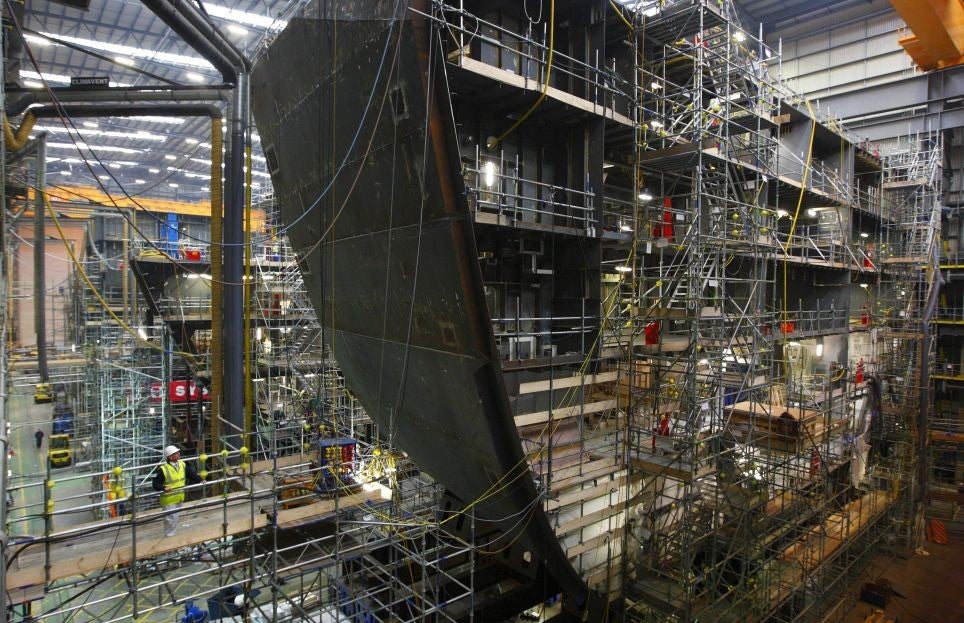
Your support helps us to tell the story
From reproductive rights to climate change to Big Tech, The Independent is on the ground when the story is developing. Whether it's investigating the financials of Elon Musk's pro-Trump PAC or producing our latest documentary, 'The A Word', which shines a light on the American women fighting for reproductive rights, we know how important it is to parse out the facts from the messaging.
At such a critical moment in US history, we need reporters on the ground. Your donation allows us to keep sending journalists to speak to both sides of the story.
The Independent is trusted by Americans across the entire political spectrum. And unlike many other quality news outlets, we choose not to lock Americans out of our reporting and analysis with paywalls. We believe quality journalism should be available to everyone, paid for by those who can afford it.
Your support makes all the difference.The full costs of scaling back Britain's aircraft carrier programme are still not fully understood by the Government more than a year after the changes were made in the Strategic Defence and Security Review (SDSR), a cross-party committee of MPs said today.
The cash savings from the revised plan will only be £600 million and there remained "considerable uncertainty" about the cost of modifying one of the new ships to accommodate a different kind of fighter jet, according to the Commons Public Accounts Committee (PAC).
That would not be known until December 2012, the committee said.
It accused the Ministry of Defence (MoD) of focusing on "short-term" affordability in drawing up options for the SDSR to cover a £38 billion black hole in its budget.
Under the SDSR plans set out in October 2010, the construction of the two Queen Elizabeth class carriers ordered by the previous Labour government is going ahead.
However, one of the ships will be mothballed to save costs and the other will be converted to operate a cheaper Joint Strike Fighter, rather than the short take-off, vertical-landing (STOVL) version planned by Labour.
There will be no carrier aircraft capability between 2011 and 2020.
In a report critical of the long-term value for money of the Government's revised carrier programme, the PAC said: "To convert the ship has changed the profile of risks and costs, and the costs are not yet fully understood.
"The switch from the short take-Off and vertical landing (STOVL) variant of the Joint Strike Fighter to the carrier variant has reduced the technical risks associated with the STOVL aircraft.
"But the costs of converting the carrier for the carrier variant aircraft will not be known until December 2012, leaving the project at risk of cost growth and slippage, and there are new technical risks and challenges integrating the new aircraft with the carriers."
The committee said the MoD had "concentrated on immediate cash savings and short-term affordability, and did not focus strongly on long-term value for money".
"The department believes that the SDSR decision will save £3.4 billion, but only £600 million of this is cash savings while the remainder is simply deferring expenditure beyond the department's 10-year planning horizon."
Committee chairwoman Margaret Hodge, a Labour MP, said: "Once again, a major MoD project will be completed much later, cost much more and offer less military capability than originally planned.
"Changes to the aircraft carriers and the aircraft flying from them in the 2010 Strategic Defence and Security Review have changed the risks and costs involved in ways that are not fully understood.
"Rather than two carriers, available from 2016 and 2018, at a cost of £3.65 billion, we will now spend more than £6 billion, get one operational carrier and have no aircraft carrier capability until 2020 - almost a decade."
Shadow defence secretary Jim Murphy said there was "a gaping hole" in the Government's credibility on defence.
"It is high time ministers took responsibility for their actions. The rushed, Treasury-driven defence review left Britain without aircraft flying from an aircraft carrier for a decade.
"The Prime Minister tried to play politics with this vital issue but, due to his Government's decisions, this project is based on uncertain and growing costs.
"Yet again we have a respected body giving a damning assessment of the defence review, which was driven by short-term cash savings, not strategic need, and limits Britain's ability to project power."
Defence Secretary Philip Hammond said: "We are tackling the inherited black hole in the defence budget and, earlier this month, the National Audit Office (NAO) rightly recognised the work that this Government is undertaking to bring the department's finances back into balance.
"When this Government came into power, the Queen Elizabeth Class carriers were already £1.6 billion over budget.
"As part of an overall package of measures taken in the Strategic Defence and Security Review we have reduced overall spending on the Carrier Strike Programme by £4.4 billion over the next 10 years.
"The NAO and the Public Accounts Committee have both acknowledged that our decision to build a second aircraft carrier makes financial sense. Converting one of the Queen Elizabeth Class aircraft carriers to operate the more capable carrier variant of the Joint Strike Fighter fast jet from 2020 will maximise our military capability and enhance inter-operability with our allies.
"Operating the more cost effective carrier variant fast jet will, in the long-term, offset the conversion costs and provide us with aircraft that have a longer range and carry a greater payload.
"Until our new carrier capability comes into service, we can utilise our extensive basing and over-flight rights to project decisive air power, as we showed during the Libya campaign."
PA
Join our commenting forum
Join thought-provoking conversations, follow other Independent readers and see their replies
Comments